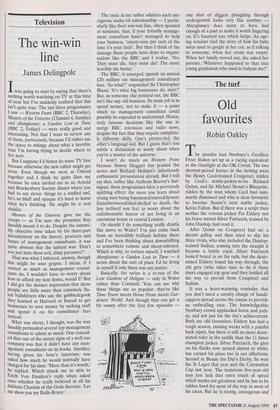Television
The win-win line
James Delingpole
Iwas going to start by saying that there's nothing worth watching on TV at this time of year but I've suddenly realised that this isn't quite true. The last three programmes I saw — Western Front (BBC 2, Thursday), Masters of the Universe (Channel 4, Sunday) and Aberglasney: a Garden Lost in Time (BBC 2, Friday) — were really good and interesting. Not that I want to review any of them, particularly, because I'd rather use the space to whinge about what a horrible time I'm having trying to decide where to live next.
But I suppose I'd better do some TV first because otherwise the new editor might get cross. Even though we were at Oxford together and I think he quite likes me because he once invited me to an Arnold and Brackenbury Society dinner where you had to say clever things to a stuffed owl, he's so bluff and opaque it's hard to know what he's thinking. He might be a real stickler.
Masters of the Universe gave me the creeps — as I'm sure the presenter Ray Snoddy meant it to do. Despite the ostensi- bly objective tone taken by his three-part documentary on the history, practices and future of management consultants, it was quite obvious that the subtext was: 'Don't you just hate these evil, slimy parasites?' That was what I inferred, anyway, though this might be sour grapes. I mean, if I earned as much as management consul- tants do, I wouldn't have to worry about how to afford my next home, would I? But I did get the distinct impression that these people are little more than extremely flu- ent bullshitters who use the gobbledegook they learned at Harvard or Insead to get businesses to save money by sacking staff and spend it on fat consultancy fees instead.
What was clever, I thought, was the way Snoddy persuaded several top management consultants to admit as much. One conced- ed that one of the surest signs of a well-run Company was that it didn't have any man- agement consultants on its books. Another, having given his hour's interview, was asked how much he would normally have charged for his time. 'More than it's worth,' he replied. Which struck me as akin to Erich Von Daniken's reply when asked once whether he really believed in all his dubious Chariots of the Gods theories: 'Let me show you my Rolls-Royce.' The cynic in me rather admires such out- rageous snake-oil salesmanship — I partic- ularly like their win-win line, often spouted at seminars, that, if your friendly manage- ment consultant hasn't managed to help your business, 'ninety-nine per cent of the time it's your fault'. But then I think of the damage these people have done to organi- sations like the BBC and I realise, `No. They must die, they must die! The more horribly the better.'
The BBC, it emerged, spends an annual £20 million on management consultancy fees. 'So what?' responded Sir Christopher Bland. 'It's what big businesses do, innit?' But, as someone else pointed out, the BBC isn't like any old business. Its main job is to spend money, not to make it — a point which no management consultant could possibly be expected to understand. Hence, truly fatuous decisions like the one to merge BBC television and radio news, despite the fact that they require complete- ly different skills. One's picture-led, the other's language-led. But I guess that's too subtle a distinction to worry about when you're a master of the universe.
I won't do much on Western Front because Simon Hoggart has praised the series and Richard Holmes's infectiously enthusiastic presentation already. But I will say that, rather like Anthony Beevor's Stal- ingrad, these programmes have a perversely uplifting effect: the more you learn about young men being bayoneted/starved/frozen/ flamethroweredfshot/shelled to death, the less inclined you feel to worry about the unfathomable horror of not living in an enormous house in central London.
Or should I do something really drastic like move to Wales? I've just come back from an incredibly brilliant holiday there and I've been thinking about downshifting to somewhere remote and sheep-infested. Which is why, to torture myself, I watched Aberglasney: a Garden Lost in Time — a series about the sort of place I'd be living in myself if only there was any justice.
Basically, the series is a re-run of the Lost Gardens of Heligan — only in Wales rather than Cornwall. You can see why these things are so popular: they're like Time Team meets Home Front meets Gar- deners' World. And though they can get a bit samey after the first few episodes — one shot of diggers ploughing through undergrowth looks very like another Aberglasney does seem to have had enough of a past to make it worth lingering on. It's haunted too, which helps. An age- ing retainer told the story of how his baby sister used to gurgle in her cot, as if talking to someone, when her room was empty. When her family moved out, she asked her parents, 'Whatever happened to that nice young gentleman who used to babysit me?'


























































 Previous page
Previous page